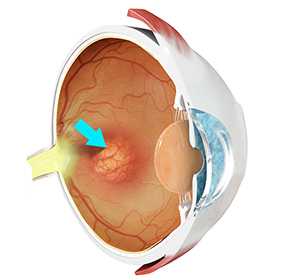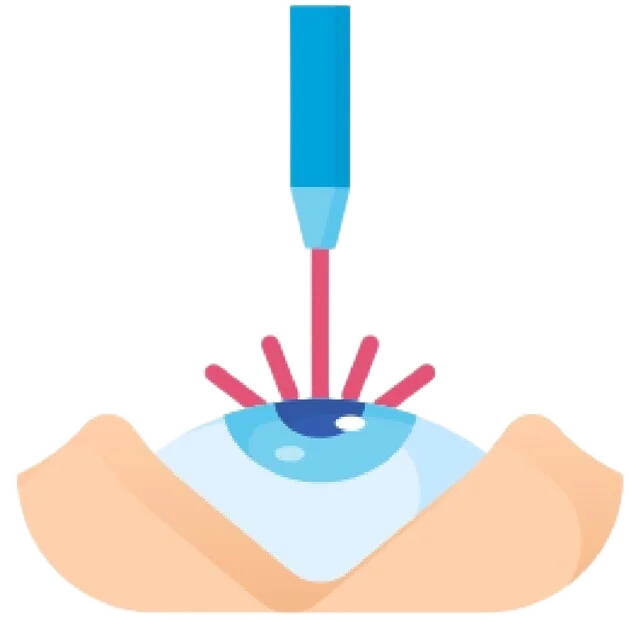
Introduction
Macular degeneration is a condition that affects the macula, the central part of the retina responsible for sharp, detailed central vision. This part of the eye allows you to read, recognise faces, and see colours clearly. When the macula degenerates, central vision becomes blurred or lost, making everyday activities challenging.
Macular degeneration is a leading cause of vision loss, especially in adults over 60. It typically progresses gradually but can severely impact quality of life if untreated.
Causes and Risk Factors of Macular Degeneration
What Causes Macular Degeneration?
Macular degeneration occurs due to a combination of genetic and environmental factors that affect the health of the macula. Several risk factors increase the likelihood of developing this condition, especially as people age.
Key causes and risk factors include:
- Age over 60
The risk increases significantly with age, especially in those over 60 years old. - Female sex
Women are more commonly affected by macular degeneration than men. - Smoking
Smoking damages blood vessels and increases oxidative stress, contributing to macular damage. - Prolonged sun (UV) exposure
Long-term exposure to ultraviolet light can harm retinal cells and accelerate degeneration. - Family history
A positive family history suggests a genetic predisposition to macular degeneration. - High blood pressure and obesity
These conditions can affect blood flow and promote damage to the retina. - Previous macular degeneration in one eye
Having macular degeneration in one eye increases the risk of it developing in the other eye.
Understanding these factors can help identify those at higher risk and encourage early monitoring and lifestyle changes to slow progression.
Types of Macular Degeneration
The Different Types of Macular Degeneration
Macular degeneration is mainly divided into two types. Understanding the differences helps guide diagnosis and treatment.
Dry Macular Degeneration
- Description:
The most common form, characterised by the buildup of small yellow deposits called drusen beneath the retina, leading to gradual degeneration of the macula’s photoreceptor cells. - Who it affects:
Primarily adults over 60 years old. - Speed of progression:
Slow and gradual, often worsening over years.
Wet Macular Degeneration
Description:
Caused by abnormal growth of fragile, leaky blood vessels beneath the macula, which can rapidly damage the retina and central vision.Who it affects:
Less common but more severe; can affect adults typically over 60.Speed of progression:
Rapid progression, with vision loss occurring over days to weeks.
Early Signs & Symptoms
Common Symptoms of Macular Degeneration
Recognising the early signs of macular degeneration is important for timely diagnosis and preserving vision. Symptoms often develop gradually and may initially affect only one eye.
- Blurry or shadowed central vision
Vision becomes unclear or darkened in the central field, making detailed tasks difficult. - Difficulty recognising faces and colours
Fine details and colour perception may be noticeably reduced. - Distorted or wavy vision
Straight lines may appear bent or warped, especially in wet macular degeneration. - Blind spot formation
In advanced dry macular degeneration, a growing blind spot appears in central vision. - No pain or redness
The eyes typically do not hurt or become red during early or even advanced stages.
Diagnosis and Treatment of Macular Degeneration
Macular degeneration is diagnosed through a comprehensive eye examination that includes tests for visual acuity and detailed imaging of the retina. Tools like the Amsler grid help detect early visual distortions, while imaging methods such as optical coherence tomography (OCT) and fluorescein angiography provide detailed views of retinal structure and blood flow. Treatment varies by type: dry macular degeneration has no cure but may benefit from nutritional supplements and lifestyle changes to slow progression, while wet macular degeneration requires prompt interventions such as anti-VEGF injections, laser therapy, or photodynamic treatment to control abnormal blood vessel growth and preserve vision.
Why Timely Diagnosis Matters
Early diagnosis of macular degeneration is essential to slow vision loss and prevent severe complications, especially in the more aggressive wet form. Prompt detection allows for effective management, which can preserve vision and improve quality of life.
Timely diagnosis allows your ophthalmologist to:
- Identify the type and stage of macular degeneration accurately
- Monitor progression and adjust treatment plans accordingly
- Prevent rapid vision loss, particularly in wet macular degeneration
- Recommend lifestyle changes and nutritional support to slow dry macular degeneration
- Provide timely interventions such as anti-VEGF therapy to preserve central vision
Addressing macular degeneration early improves outcomes and helps maintain the best possible vision.
Continue Learning About Other Eye Conditions
Other Eye Conditions
The eyes are the most complex sensory organ in our bodies. The eyes provide vision by recording images of our surroundings that the brain will interpret. Although the eye measures only about an inch...
Epiretinal Membrane
An epiretinal membrane also called a macular pucker, premacular fibrosis, surface wrinkling retinopathy or cellophane maculopathy is a thin film of fibrous tissue that forms over the macula...
Worried About Your Vision?
Schedule a consultation with Mr. Mo Majid to evaluate your eye health.
Quick Answers About Macular Degeneration
Can macular degeneration be cured?
Currently, there is no cure for macular degeneration. However, treatments can slow progression and help preserve vision, especially if diagnosed early.
Is vision loss from macular degeneration reversible?
Vision loss from dry macular degeneration is usually gradual and irreversible. In wet macular degeneration, timely treatment can sometimes improve or stabilise vision.
How often should I have my eyes checked if I have macular degeneration?
Regular eye exams are essential, typically every 6 to 12 months, or as recommended by your ophthalmologist to monitor changes and adjust treatment.







